- Home
- Brian Falkner
The Project Page 19
The Project Read online
Page 19
There was another loud burst of machine-gun fire behind them. Plaster flew in puffs from the walls, and a mirror on the far wall, somehow still intact, shattered and fell.
They ducked and Luke looked back to see Mueller and Mumbo closing in on the hotel.
“Hurry,” Tommy said.
Mumbo fired again as they stumbled deeper into the ruin. The staircase down to the bunker was undamaged, and they pretty much fell down it, dragging themselves back to their feet at the bottom.
The large metal door that led into the complex was shut, and when Luke tried the handle, he found it was locked.
Above they could hear Mueller and Mumbo moving through the rubble on the first floor.
Tommy banged desperately on the door, and to Luke’s amazement, there was a click, and it opened an inch.
An eye peered out, but when it saw two boys, bruised, battered, in ragged Hitler Youth uniforms, the door sprung open.
The man at the door was a tall SS officer with a black patch over one eye and a jagged scar that ran from his ear to his chin. He moved aside to let them in.
A few more SS men were in the corridor, all armed with pistols or automatic weapons. Other eyes watched them from the doorways that lined the corridor.
There were footsteps on the stairs behind them.
Luke, still leaning on Tommy’s shoulder, put his mouth to Tommy’s ear and whispered, “American soldiers.”
Tommy caught on at once. “Amerikanische Soldaten!” he shouted, pointing behind them at the stairs. “Amerikanische Soldaten!”
Luke couldn’t imagine what American soldiers would be doing advancing through Obersalzberg in the middle of an air raid, but it was enough to panic the SS troops.
The first man slammed the big metal door and flicked shut the catches on all four corners. Luke and Tommy were bustled away from the entrance, and the SS took defensive positions in the corridor, training their weapons on the door. From the nursing station, a woman beckoned to Luke and Tommy, but they didn’t have time for that. Luke shook his head and gestured down the corridor as if they had somewhere they needed to be.
Which they did.
They heard a banging on the door behind them and shouts muffled by the metal.
The SS troops would be suspicious, suspecting a trick by the “American soldiers” outside, but it wouldn’t take Mueller long to convince them.
They walked as quickly as they could past the dim doorways and the frightened eyes that peered out from each room, trying not to look like they were running.
Inside the bunker, the going was easier, flatter.
“I’m okay,” Luke said to Tommy. “I can walk.”
“You sure?” Tommy asked.
“Sweet as.” Luke forced a quick grin.
Tommy took Luke’s arm from around his shoulders but still supported him with a strong grip on his upper arm.
A teenager, about their age, stepped into the corridor in front of them. He looked terrified, his mouth gaping.
Luke instantly recognized the protruding nose and jaw, the high, animal-like ears. It was young Erich Mueller.
Here was their enemy, just a frightened boy, watching the world he knew slowly come to an end.
“Was ist los?” he asked. “Was ist los?”
“Amerikanische Soldaten!” Luke said, mimicking Tommy.
Mueller’s eyes opened wide in horror, and he disappeared back into his room. Luke stared after him for a second, dumbfounded by the exchange, by the strange twist in time that had him feeling sorry for the child who would grow up to be the man who was currently trying to kill him.
Then Tommy hauled him forward again.
Nobody stopped them. Nobody questioned them.
But the banging on the door behind them stopped, and he suspected that Mueller had managed to talk his way inside.
The corridor into the Werewolf lair was deserted, and they broke into a lurching run, turning off the linking tunnel into the main corridor. Gunfire rattled behind them, and bullets ricocheted off the concrete walls and floor of the tunnel.
“Go,” Luke said, and pushed Tommy into the tunnel in front of him. “I’m okay.”
They ran a few yards, and Luke could see the odd oval door that led down to the cave of the Vitruvian chamber. Suddenly there was a metallic scraping sound from behind them.
He looked back to see a strange tin can with a long wooden handle bouncing along the floor of the tunnel.
“Grenade!” he shouted. He dived to the side, pushing Tommy through a side door.
The explosion, in the confined space of the tunnel, was ear-shattering, and Luke saw, rather than heard, Tommy mouth the words Go, go! as he dragged Luke back to his feet and pushed him through the smoke and smell of cordite, down the corridor.
Then the huge metal door to the lower staircase was in front of them. The handle that had seemed so heavy in the future spun like a feather in their adrenaline-fueled hands.
They slammed the door shut behind them and braced it with a solid length of timber that fitted into two brackets on either side of the door.
Almost immediately, there was a hammering on the other side of the door, but they ignored it and hurried down the long staircase to the cave.
They had reached the bottom and were hauling the second door open when there came another shattering blast from above, and shards of concrete and rock rained down on them from the top of the stairs.
Luke looked up to see the metal door hanging uselessly, limply open, smoke and dust swirling around it.
“Go, go, go!” he yelled, diving through the door after Tommy. He kicked it shut behind him and jammed home the latch just as the thump of an explosion sounded on the other side. Dust billowed around the edges of the door, but it held firmly.
There was a light switch by the door, and he flicked it on, filling the corners of the deep cave with a harsh glare.
The foundations of the metal wall lay in front of them. To the sides were the piles of timber, wire, and boxes of nuts and bolts they had seen earlier. Some empty crates were stacked against the cave wall.
“Come on!” Tommy yelled.
“No! Wait!” Luke shouted. He shuffled over to the wooden crane, holding on to one of the legs for support.
“What?”
Luke tried to calm his breathing and think clearly through the pain from his ribs and leg. “We have to destroy the chamber,” he said.
“Let’s just get out of here,” Tommy said. “Cut some ropes, trap them in 1944.”
“That’s not enough,” Luke said. “We have to destroy it and make sure nobody ever uses it again.”
Another explosion sounded behind the metal door, and more dust blew from around the edges, but it held.
“Let’s get back home,” Tommy pleaded. “We’ll find some explosives and blow the chamber up.”
“Where exactly are you going to find explosives?” Luke asked. “And would you know what to do with them if you found them?”
“What, then?”
Luke looked around the cave, and his eyes fell on one of the caches of building materials. “All we need,” he said, “is a few nuts and bolts and a bit of wire.”
Working through the fear and the pain, they dragged one of the wooden crates of metal bolts beneath the crane. They fed the chain through the carry-handles, then hoisted the crate up as high as it would go.
The crane was on wheels, but there was a locking lever and they had to release each wheel individually before it would move.
There were no more explosions from the metal door, but it shook with a steady hammering.
Luke and Tommy pushed the tall frame of the crane to the center of the cave, using the white chalk cross as a marker.
“I hope this works,” Tommy said.
“It will,” Luke replied.
The hammering on the door continued, and one of the hinges popped.
“We gotta go,” Tommy said.
“Two secs,” Luke said.
He grabbe
d a reel of wire from a pile of building materials. It was light, no more than twelve or fourteen gauge. He twisted one end around the release pin on the block and tackle of the crane, then fed it back toward the door.
The blows of a sledgehammer rained constantly on the other side, and the door shook as he twisted the wire around its handle.
“That’s it. Let’s go,” he said.
The moment the door opened, the release pin would pop and the crate of metal bolts would fall right into the Vitruvian chamber.
They had to be long gone before that happened.
Tommy had pushed a couple of empty crates across the floor below the tripod. He stacked one crate on top of another and then put another crate up against it, to make a stair. They had fallen about half a yard, Luke remembered, so that was how high they needed to be now. The center of the Vitruvian chamber, on the other side of time.
“What if the chamber has stopped working?” Tommy asked. “What do we do if someone has altered the settings?”
“Don’t even think about it,” Luke said.
Tommy smiled. “You first,” he said, helping Luke up onto the first step of the makeshift platform.
Luke looked up at the box of bolts hanging above their heads. “See you next century, bro!” he said.
“You bet, dude,” Tommy said.
Luke climbed onto the next level and stood upright.
Instantly, he felt the buzzing and the hair-raising, skin-prickling presence of the chamber. Then the hammering sounds faded into nothingness, as did the bright lights and walls of the cave.
He was back in the chamber, surrounded by the charcoal walls of the rare-earth magnets.
He crawled over to the hatch and looked back to see Tommy right behind him.
“How long have we got?” Luke asked.
“Seconds!” he said. “They’re on the last hinge!”
Luke stumbled down through the hatch, falling to the ground, and looked up to see Ms. Sheck’s horrified face.
“What happened to you?” she asked.
“Never mind,” he yelled. “Just run!”
She didn’t run. She stepped toward Luke, bent down, grabbed his arm, and pulled him up over her shoulder in a firefighter’s lift. His ribs screamed fire, but he gritted his teeth and made no sound.
She ran, and Tommy ran with her, through the diagonal door of the shield wall, to the high concrete staircase leading back to the upper levels.
Tommy slammed the metal door shut behind them.
There were 217 stairs, but Ms. Sheck never once faltered, bounding up with Luke on her shoulder. A strange, fierce shape filled his sight, jumping and bouncing around before his eyes while his exhausted brain tried to make sense of the vision. It snarled, and its eyes burned into him as they put more and more distance between themselves and the impending disaster. They had reached the top of the stairs before Luke realized that he was staring at the tattoo of the roaring lion on her arm.
Tommy slammed open the top door, and they hurried along the corridor.
“What’s happening?” Ms. Sheck had little breath to ask.
“I’ll tell you soon,” Luke said.
In his mind, he could see it all.
The final sledgehammer blow. The door pulling open. The metal wire tightening, then popping the release pin.
The box of metal bolts beginning to fall. Dropping right into the portal between time.
And as it fell, it slipped out of 1944 and into the future, but in the future there was a chamber, made of the strongest, yet most brittle magnets known to man. The most powerful magnetic force ever concentrated in one place.
And the box of heavy iron bolts was about to appear in the middle of it.
The sheer energy, contained in such a small space, was almost impossible to imagine.
Each bolt would accelerate with explosive force, smashing into the brittle fabric of the rare-earth magnets. The chamber would disintegrate, and even as it did so, the flying shards of magnet would attract and repel each other over and over again. It would all happen in an instant.
Even as he thought that, the ground heaved beneath their feet and they were thrown down.
The metal door behind them was blown off its hinges like a sliver of tinfoil, rock and dust billowing into the tunnels behind them.
Then, almost immediately, came an implosion, the dust and smoke sucked back down into the depths of the tunnels, rushing back to fill the vacuum that had been created.
For a moment, all the air disappeared and they gasped for breath, before the pressure slowly began to return to normal.
It was over.
The chamber was gone.
The book, Leonardo’s River, was destroyed along with it.
Hitler would lose the war, and the world, for good or bad, would be the same as it always had been.
Mueller himself would be trapped. An old man trapped in the wrong time.
He might try to tell people of the future, but they would just think him crazy.
A crazy old man.
Ms. Sheck was first to her feet and extended a hand down to Tommy and then Luke.
Luke took it and stood, brushing dust and rock particles from his clothes.
“Where’s Gerda?” he asked.
“She left,” Ms. Sheck said. “I don’t know where she went.”
There was a long period of silence; then she asked, “Are you going to tell me what happened?”
Despite the shock and the pain, or perhaps because of it, Luke laughed. “Can it be our new project, instead of The Last of the Mohicans?”
Ms. Sheck smiled.
EPILOGUE
Tommy and I told Ms. Sheck most of what happened, but we also swore each other to secrecy.
The ability to change the past and steal knowledge from the future. Was there anybody on earth who would not abuse that power?
Leonardo was right. If it came to light, then someone, somewhere, would misuse it.
Leonardo’s drawings had been destroyed by Benfer, and Benfer’s book, and the chamber itself, had been lost in the explosion at the bunker.
So that, pretty much, was that.
Almost.
Somehow, even though I knew the risks, I could not bring myself to completely destroy this centuries-old knowledge. The most amazing discovery of Leonardo da Vinci.
I justified it to myself by thinking that maybe one day there would be some terrible catastrophe, like a nuclear war, and the Vitruvian chamber could be rebuilt to save the world from disaster. That maybe in the future, people would learn to live in harmony and to use the knowledge responsibly.
But I knew that really I was just making excuses.
Like Benfer, I couldn’t bring myself to wipe the knowledge completely from the face of the earth.
And the plans did still exist, of course.
In the strange and fickle memory of a fifteen-year-old boy.
I knew I couldn’t rely on that memory forever. I had to record Leonardo’s calculations somewhere.
But where?
How could I hide this information so thoroughly, so completely, that it could never be found, and yet at the same time, it was not forever lost?
A code.
I needed a code that would be impossible to break, protected by a key that was infinite.
It took me a year. Six months to create the code, and another six months to encode the numbers and the diagrams.
And where to store the code? There was only one place, of course. Woven into words, secreted into sentences, pasted into paragraphs, concealed into chapters, buried in a book.
Hidden in plain sight.
I went to Dad’s computer and laid out the sheets of encoded data beside me on the desk. Then I typed the first words of my novel slowly, knowing that everyone who read these words would regard it as just a story. Fiction. No one would ever believe that it was true.
“This is not the most boring book in the world,” I wrote. “This is a book about the most boring book in t
he world.” I considered that for a moment, then replaced the period with a comma and added: “which is a different book altogether.”
CONGRATULATIONS
The following people won the grand prize in my school competitions and have all had a character named after them in this book:
DARCY BENFER
Brisbane Boys’ College, Queensland, Australia
BRYAN BROWN
Vista Del Valle School, California, United States
GLENN DINNING
Mount Tarampa State School, Queensland, Australia
AARON FAYERS
Lincoln Heights School, New Zealand
JACOB ISHERWOOD
Kimberley College, Queensland, Australia
MR. KERR
Masterton Intermediate School, New Zealand
PHILIPP KHODIER
St. Patrick’s College Strathfield, NSW, Australia
BEN PICKERING
Point View School, New Zealand
JENNIFER SEDDON
Tinopai Primary School, New Zealand
CLAUDIA SMITH
St. Joseph’s School, New Zealand
ALSO:
Luke McKay, Laetitia Sheck,
Heath Thompson, Tom Wundheiler
THANKS
CHRIS DOYLE
strength coach, University of Iowa Hawkeyes
KRISTI BONTRAGER
public relations coordinator, University of Iowa Libraries
CHRISTOPHER MERRILL
International Writing Program (IWP), University of Iowa, for his firsthand account of the floods
THE IWP TEAM:
Hugh Ferrer
Joe Tiefenthaler
Melissa Schiek
Kiki Petrosino
Kelly Bedeian
Nataša Ďurovičová
Peter and Mary Nazareth
Kecia Lynn
BRIAN FALKNER attended a three-month writing residency at the University of Iowa’s International Writing Program in 2008. He arrived in Iowa City not long after devastating floods had ravaged the region. His experience there became the inspiration for The Project.
To learn more about Brian and his books, visit brianfalkner.com.

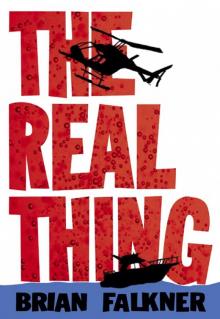 The Real Thing
The Real Thing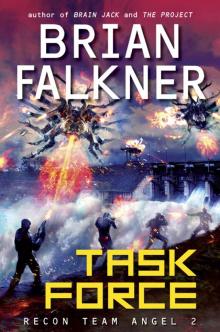 Task Force
Task Force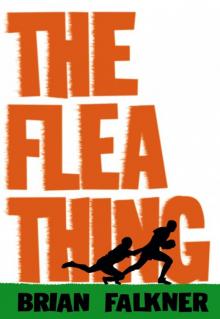 The Flea Thing
The Flea Thing The Project
The Project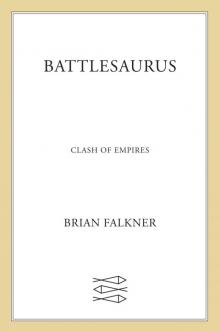 Clash of Empires
Clash of Empires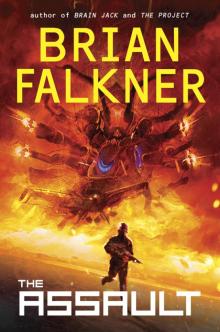 The Assault
The Assault Brain Jack
Brain Jack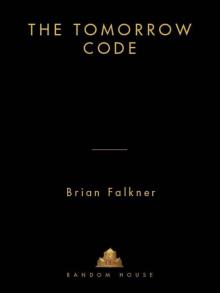 The Tomorrow Code
The Tomorrow Code Vengeance
Vengeance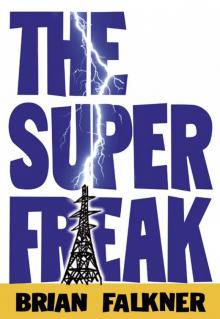 The Super Freak
The Super Freak Northwood
Northwood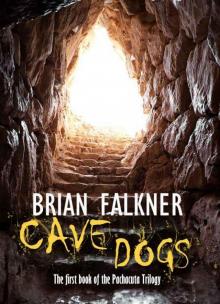 Cave Dogs (Pachacuta Book 1)
Cave Dogs (Pachacuta Book 1)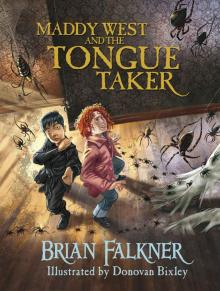 Maddy West and the Tongue Taker
Maddy West and the Tongue Taker